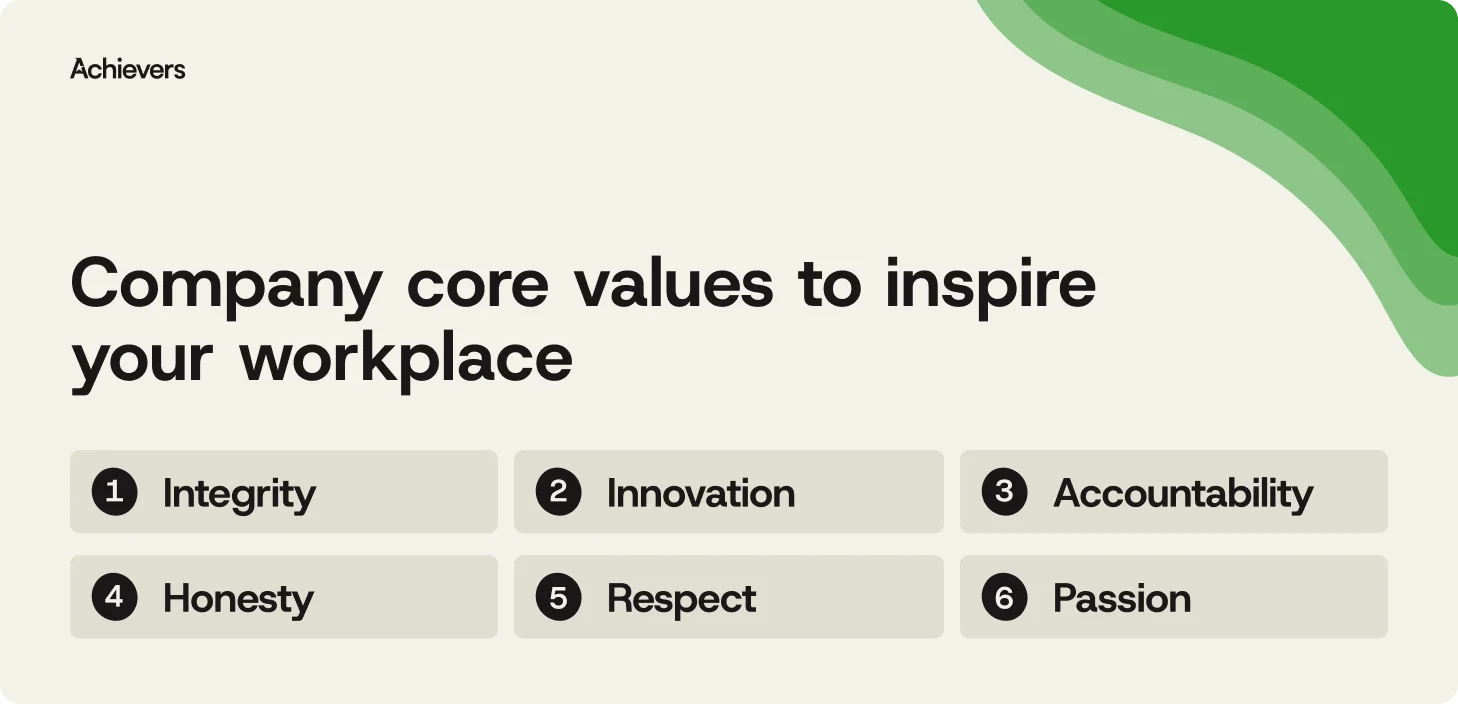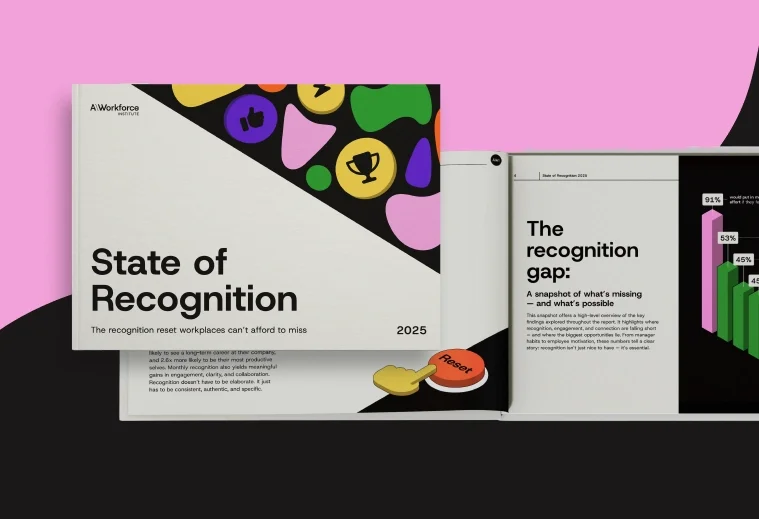Table of contents
Create a culture that means business™
Schedule a demo with an Achievers solution expert today.
Company core values shape how employees experience work every day. They influence decisions, guide behaviors, and define the culture people feel the moment they walk through the door. But Gallup research shows only two in 10 employees feel strongly connected to their company’s culture.
That’s because values only stick when they’re lived — not just written down. They need to be seen in action — modeled by leaders and reinforced through recognition. When people are recognized for living your values, those behaviors get repeated. And that’s how culture becomes real.
Let’s explore what makes company core values meaningful and how to define the ones that reflect your organization best.
25 examples of company core values to inspire your workplace
Company core values shape how employees show up at work — and how work shows up for them. They act as a north star, guiding behavior, shaping culture, and creating a shared sense of purpose. nd when those values are reinforced through weekly recognition, employees are 9x more likely to feel a sense of belonging, according to our State of Recognition Report.
That’s the chain reaction: values drive behaviors, behaviors build culture, and culture fuels business results.
Looking for inspiration? Here are 25 company core values that can help shape and strengthen your workplace.

1. Integrity
Doing the right thing — even when no one’s looking. Integrity is about staying honest, accountable, and transparent in every decision and action.
2. Innovation
Challenging the status quo with curiosity and new ideas. Innovation means testing, learning, iterating — and never settling for “good enough.”
3. Accountability
Owning outcomes, learning from missteps, and following through. Accountability builds trust and shows that responsibility is more than a buzzword.
4. Honesty
Being upfront, clear, and candid. An honest workplace makes it easier to solve problems, make decisions, and move forward together.
5. Respect
Treating everyone with dignity, regardless of role, background, or opinion. Respect shows up in how we listen, collaborate, and give credit where it’s due.
6. Passion
Bringing energy and purpose to your work. Passion helps people stay motivated, tackle challenges, and take pride in what they do.
7. Trust
Creating an environment where people feel safe to speak up, take risks, and be themselves. Trust is the foundation for connection, psychological safety, and long-term engagement.
8. Teamwork
Combining diverse strengths to reach team or company-wide goals. Teamwork means collaborating openly, supporting one another, and celebrating wins — together.
9. Creativity
Looking at challenges with fresh eyes and exploring new solutions. Creativity encourages experimentation, even if it means learning from a few flops.
10. Compassion
Empathizing with others, offering support, and showing care — especially when it’s hard. Compassion helps people feel seen and valued.
11. Courage
Doing what’s right, even when it’s uncomfortable. Courage means speaking up, standing by your values, and pushing forward in the face of uncertainty.
12. Loyalty
A deep commitment to the organization’s mission, values, and success. Loyalty goes beyond tenure — it’s about showing up with care and consistency.
13. Adaptability
Staying flexible when plans shift, markets change, or challenges come up. Adaptability helps teams bounce back, pivot fast, and keep moving forward.
14. Dependability
Following through, showing up, and being someone that others can count on. Dependability turns trust into action — and keeps teams running smoothly.
15. Excellence
Setting the bar high and pushing to exceed it. Excellence is about taking pride in your work, striving to improve, and never coasting on “good enough.”
16. Happiness
Creating a work experience people actually enjoy. Happiness drives employee engagement, strengthens morale, and makes Monday mornings feel a little lighter.
17. Health
Prioritizing both mental and physical well-being. A culture that supports health helps people thrive — and that’s good for business and people alike.
18. Humility
Staying open to feedback, ideas, and other perspectives. Humility means recognizing that we’re all still learning — and better together.
19. Kindness
Leading with empathy, patience, and generosity. Small acts of kindness build stronger teams and help everyone feel more connected.
20. Knowledge
Sharing what you know — and being curious about what you don’t. Knowledge grows when it’s passed on, not just kept in a folder or in your own head.
21. Leadership
Inspiring, empowering, and guiding others toward shared goals. Leadership isn’t about titles — it’s about impact.
22. Openness
Creating space for honest conversations, new ideas, and feedback — even the uncomfortable kind. Openness builds trust and drives progress.
23. Commitment
Showing up with focus, care, and follow-through. Commitment means believing in the work and doing what it takes to see it through.
24. Community
Fostering a sense of belonging that goes beyond job titles. Community is about shared purpose, connection, and building something bigger — together.
25. Diversity
Valuing different perspectives, backgrounds, and ways of thinking. Diversity fuels innovation and helps everyone do their best work.
How to define company core value statements
Your core values shouldn’t feel like wallpaper — something everyone sees but no one really notices. They should feel lived. Real. Obvious in the way people collaborate, make decisions, support each other, and show up every day.
Defining those values starts by understanding who you are as a company — and who you want to be. It’s about capturing the heart of your culture and turning it into a language people can connect with.
Here’s how to do it in a way that feels meaningful — not manufactured:
- Keep it short: If your values don’t fit on a coffee mug (or a Slack message), they’re probably too long. Aim for clear, punchy language that people can remember — and better yet, use.
- Be specific: “Excellence” is great — but what does it truly look like in your workplace? The more tied your values are to your mission and day-to-day reality, the more likely people are to live them, not just nod at them during onboarding.
- Think beyond your walls: Your values shouldn’t just speak to employees — they should shape how customers, partners, and communities experience your brand. Values with a ripple effect are the ones that build real trust.
- Make them unmistakably yours: If your values could be swapped onto another company’s website without anyone noticing, start over. What makes your culture tick? What do your people take pride in? Lean into that. No one’s inspired by “innovative synergy” — not even your leadership team.
Recognition: Bringing company core values to life
Even the most inspiring core values won’t mean much if they’re not recognized in action. Recognition is what turns those values into something real. Tangible. Repeatable.
When people are celebrated for living your values, those behaviors catch on. They spread. And that’s how culture shifts — not through memos, but through moments that matter. In fact, Achievers Workforce Institute (AWI) found that 60% of HR leaders with an online recognition solution see measurable business results, compared to just 30% with an internal program.
That’s the power of a platform like Achievers. With our software, you can:
- Reinforce your values daily by recognizing the behaviors that reflect them
- Reach everyone with tools that work in the flow of work — from frontline to remote
- Personalize the experience with meaningful, localized rewards across 190 countries
- Gain real-time insights into recognition trends and cultural alignment
- Boost engagement with 2x the recognition frequency of other platforms
- Recognition goes beyond a simple thank you. It’s how you scale the culture you want to see.
Make company core values a part of your workplace culture
Core values shouldn’t just live on your website or in your onboarding deck — they should show up in how people lead, collaborate, and make decisions. When values are recognized in action, they become more than statements. They become part of your company culture.
At Achievers, we know the power of living your values — because we live ours: It’s the people, Be bold, Own the outcome, One team, Win with customers. And through our recognition platform, we help organizations do the same by spotlighting the everyday moments that bring company values to life.
Because what gets recognized gets repeated. And that’s how you build a culture that sticks.
Ready to make your values more than words? Achievers helps you turn core values into real-world behaviors that strengthen culture, boost engagement, and drive business results — every day.




